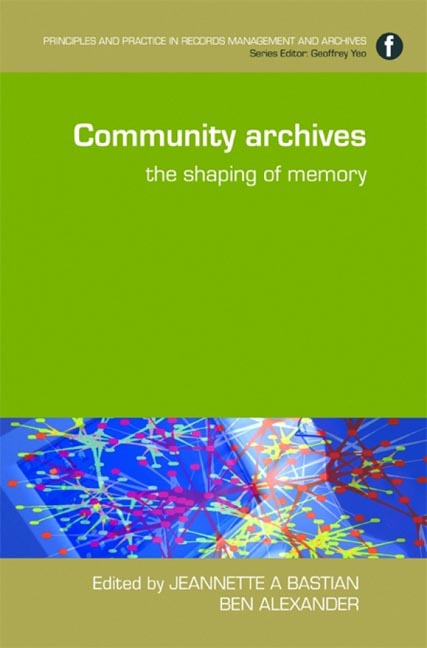Book contents
- Frontmatter
- Contents
- Introduction to the series
- Acknowledgements
- Contributors
- Introduction: Communities and archives – a symbiotic relationship
- Part 1 A community archives model
- Part 2 Communities and non-traditional record keeping
- 3 The Single Noongar Claim: native title, archival records and aboriginal community in Western Australia
- 4 Oral tradition in living cultures: the role of archives in the preservation of memory
- 5 We are our memories: community and records in Fiji
- Part 3 Records loss, destruction and recovery
- Part 4 Online communities: how technology brings communities and their records together
- Part 5 Building a community archive
- Conclusion: The archivist and community
- Bibliography
- Index
- Miscellaneous Endmatter
- Miscellaneous Endmatter
- Miscellaneous Endmatter
4 - Oral tradition in living cultures: the role of archives in the preservation of memory
from Part 2 - Communities and non-traditional record keeping
Published online by Cambridge University Press: 08 June 2018
- Frontmatter
- Contents
- Introduction to the series
- Acknowledgements
- Contributors
- Introduction: Communities and archives – a symbiotic relationship
- Part 1 A community archives model
- Part 2 Communities and non-traditional record keeping
- 3 The Single Noongar Claim: native title, archival records and aboriginal community in Western Australia
- 4 Oral tradition in living cultures: the role of archives in the preservation of memory
- 5 We are our memories: community and records in Fiji
- Part 3 Records loss, destruction and recovery
- Part 4 Online communities: how technology brings communities and their records together
- Part 5 Building a community archive
- Conclusion: The archivist and community
- Bibliography
- Index
- Miscellaneous Endmatter
- Miscellaneous Endmatter
- Miscellaneous Endmatter
Summary
Introduction
Vanishingly few purely oral cultures – those that do not even communicate with a literate culture – still exist in the world. There are numerous indigenous cultures with many nonliterate members; there are also myriad modern literate subcultures that preferentially preserve all or some tradition in oral form. Both, however, are embedded to greater or lesser extent in a web of global literate cultures of varying local intensities. Some historians have argued that tradition preserved orally is not valid evidence, while others recognize it as a category of ‘memory’ that has its own rules of resonance. Modernist western archivists, themselves ref lexively literate, sit uneasily in between: charged with supporting the preservation of records of the past, they have until recently adhered to a practice almost exclusively focused on written textual objects. Now they are being confronted with memory modalities that challenge the model of sequential written text as sufficient documentation for all human cultural phenomena.
Production of information, oral and written: the ‘orality and literacy’ episteme
Although few communities in the early 21st century completely lack some kind of literacy, it is also true that few are completely documented by the written word, or will ever be so. Thus nearly all communities’ communication and recording of memory take place in a mixed environment. The discussion of orality and literacy as modalities for recording and preserving the past has most frequently been focused, somewhat abstractly, on cultures and communities seen as characterized by ‘pure orality’ – that is, communities where no written language is produced at all – or by ‘literacy’ – taken as communities where everyone is literate. Further, this discourse has been connected historically with an orientalist discourse that placed ‘oral’ and ‘literate’ in a family of binary oppositions including ancient–modern, primitive–civilized and inferior–superior, together with an argument that holds that literacy ‘transforms consciousness’ (for the better, of course) (Ong, 1991). Yet the adequacy of this whole approach to ranking the value of written and oral documentation, with its implication that the written word is more accurate or true than the orally transmitted word, has been set aside as historians and anthropologists have turned away from a positivist view of history and culture and have recognized that all literate cultures still retain many oral practices (Olson and Torrance, 1991).
- Type
- Chapter
- Information
- Community ArchivesThe shaping of memory, pp. 65 - 86Publisher: FacetPrint publication year: 2009
- 4
- Cited by



